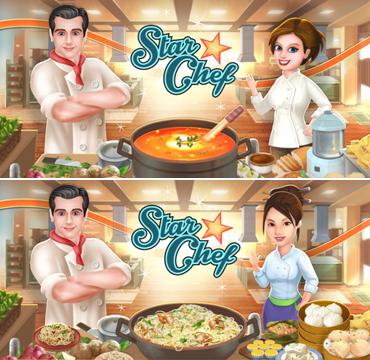Like any other global gaming studio aiming to build a globally appealing and enjoyable game, when 99Games began to scale it’s mobile social game Star Chef, one of the obvious production tasks was to localise the game in languages where we intended to expand our user base. This included European (e.g. French, German, Spanish etc) and Asian languages (Simplified and Traditional Chinese, Korean etc).
Set the Context right with text localisation:
Text localisation is the simple first step to get your game into the hands of the consumers. With text translations, non-English players can at least understand basic gameplay and can enjoy the game to a great extent, if the game has good mechanics and user experience. However, setting the context right is very important to make or break a great game. For our game Star Chef, to translators, we stressed upon the need to understand the game context and match it with the local language context. There were many information exchanges and sessions between 99Games team and localisation vendor to ensure the context of various strings, dialog, and titles are made clear. An achievement in the game ‘Green Thumb’ (achieved on harvesting many crops) if translated without contextual translation may literally sound funny. Also, not everything necessarily has a translation in the local context. In such cases, probably it’s best to keep the global word for the same than trying to force the translation. Just to give an example, the game has Chef designations – Station Chef, Sous Chef, Pastry Chef etc. In languages like French, there are specific Culinary Profession ranks for the same – Chef de partie, sous-chef, pâtissier, which will be more appropriate to use. However, a word ‘Hamburger’ is perhaps best kept as ‘Hamburger’ across most of the geos.
It’s not just about the Localisation…But also Culturalisation:
Culturalisation is about making your game, all it’s features and not just text, contextually relevant in any geo. It could be tricky at times, could be just little cultural nuances that the developer needs to take care of in the game, but will make a player feel at home with the app though it is developed in some other part of the world.
Avoid or change suitably any culturally irrelevant content
Probably a dialog or a button in the game that mentions about a social network should not exist at all if that social network isn’t available or not widely used in the target geo. Due to Facebook’s unavailability in China, we carefully altered our game features and UI of our social features. Similarly, with the changing notion of ‘Christmas Holidays’ to ‘Holiday or Festive Season’ in US, we have suitably taken care of our in-game events and social messaging.

Special touch with local contents
When we brought the game to Asian geos, along with introduction of Asian cuisines (Chinese, Thai, Korean dishes etc), we also made it a point to introduce several aesthetic elements and décor items in the game more suited for the tastes of Asians. The game splash screen was modified to show one of the Asian chefs and the platter contained blend of Asian dishes.
Local events and Festivals
It should be kept in mind to celebrate major local events and festivals in the game. For Chinese New Year, Russian Maslenitsa, Christmas etc, Star Chef offers a special themed game to the players for free where players can enjoy the festive mood without having to spend any additional currency in the game. We receive great feedback and players’ love during these updates and it helps with the prominent featuring on App Stores as well.
Take care of cultural nuances
It’s important to not hurt cultural sentiments as well, and we got that learning first-hand when we introduced several Asian dishes in the game during Star Chef’s launch in Asia. There was a bowl of noodles presented in the game with two chopsticks dipped in the food. We only realised this later when one of the superfans of the game pointed out to us that this is a way of offering the food to dead in their culture and we better avoid the same! This was a minor graphical change to be brought in, but for a game that caters to cuisine and food enthusiasts, this was a major glitch.
Do not overdo culturalisation!
It might be natural for the developers to get carried away and overdo the culturalisation. In Star Chef too, as we introduced the game characters and restaurant customers in local costumes and attires, we overdid their appearance in the game, which was not welcomed by local players. With the increasing western influence in Asian countries, it appeared rather unnatural to have many characters in traditional dresses. Players expressed their dislike for the same and we reverted the changes in subsequent updates.
Results?
The culturalisation aspects may not show results when introduced in the game one by one. But more the culturalisation aspects taken care of in the game, more you will start receiving players’ love in terms of increasing retention, good reviews and monetisation. In Star Chef, we are making a continued effort in understanding the local preferences and cultures of various geographies, collect feedbacks from players and keep improving the game; because in the end as they say ‘the customer is always right’!
(These are purely personal views of 99Games, VP, Shilpa Bhat and AnimationXpress.com does not necessarily subscribe to these views)
